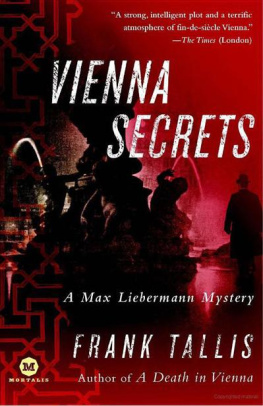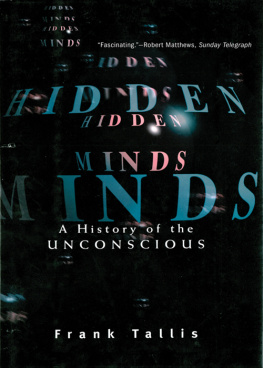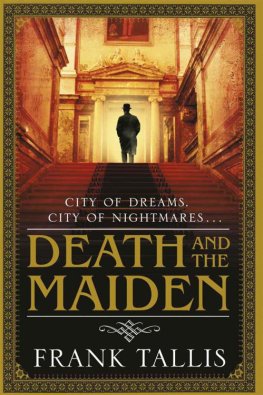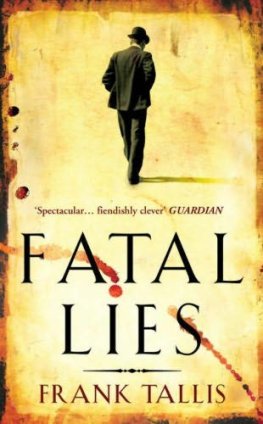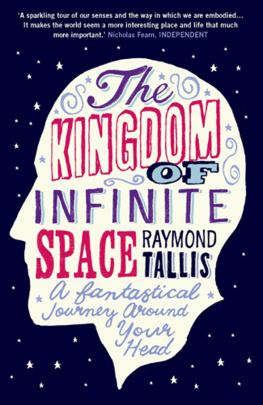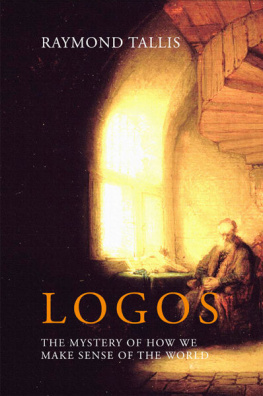Frank Tallis - Vienna Secrets
Here you can read online Frank Tallis - Vienna Secrets full text of the book (entire story) in english for free. Download pdf and epub, get meaning, cover and reviews about this ebook. year: 2010, publisher: Random House Trade Paperbacks, genre: Detective and thriller. Description of the work, (preface) as well as reviews are available. Best literature library LitArk.com created for fans of good reading and offers a wide selection of genres:
Romance novel
Science fiction
Adventure
Detective
Science
History
Home and family
Prose
Art
Politics
Computer
Non-fiction
Religion
Business
Children
Humor
Choose a favorite category and find really read worthwhile books. Enjoy immersion in the world of imagination, feel the emotions of the characters or learn something new for yourself, make an fascinating discovery.
- Book:Vienna Secrets
- Author:
- Publisher:Random House Trade Paperbacks
- Genre:
- Year:2010
- Rating:3 / 5
- Favourites:Add to favourites
- Your mark:
- 60
- 1
- 2
- 3
- 4
- 5
Vienna Secrets: summary, description and annotation
We offer to read an annotation, description, summary or preface (depends on what the author of the book "Vienna Secrets" wrote himself). If you haven't found the necessary information about the book — write in the comments, we will try to find it.
Vienna Secrets — read online for free the complete book (whole text) full work
Below is the text of the book, divided by pages. System saving the place of the last page read, allows you to conveniently read the book "Vienna Secrets" online for free, without having to search again every time where you left off. Put a bookmark, and you can go to the page where you finished reading at any time.
Font size:
Interval:
Bookmark:
I WOULD LIKE TO THANK: Hannah Black, Clare Alexander, and Steve Matthews for their valuable comments on the first and subsequent drafts of Vienna Secrets, Nick Austin for a thorough copyedit; Rebecca Shapiro, Jennifer Rodriguez, and Bara MacNeill for their assistance in preparing the U.S. edition; Simon Dalgleish for identifying German errors in the text; Luitgard Hammerer for conducting research on my behalf and providing a very good taxi service to Stift Klosterneuburg and the delightful Heurigen of Bisamberg; Penny Faith for casting a Jewish eye over the text; Dr. Julie Fox for describing the clinical signs associated with terminal syphilis; Dr. Yves Steppler, consultant pathologist, for lengthy and detailed discussions on the topics of decapitation and other aspects of pathology of interest to a crime writer; Her Excellency Dr. Gabriele Matzner-Holzer for assistance with establishing some helpful contacts in Vienna; Professor Karl Vocelka (University of Vienna) for providing me with a comprehensive list of the plague columns; and Nicola Foxfor comments, criticism, early proofreading, preliminary editing, and the odd plot contribution.
Das Vaterland was a real Catholic periodical, although I believe it might have been discontinued by 1903. Liebermanns explanation (to his father) of how dreams work can be found in Lecture 14 (Wish Fulfilment) of Freuds Introductory Lectures on Psycho-Analysis. The idea of a collective unconscious was current many years before Jung made the idea popular. Freud, and many others, considered the possibility of its existence throughout the nineteenth century (see The Discovery of the Unconscious: The History and Evolution of Dynamic Psychiatry by Henri F. Ellenberger). Lurian cosmology is paraphrased and quoted from two scholarly works on Jewish mysticism: Kabbalah: A Very Short Introduction by Joseph Dan and On the Kabbalah and Its Symbolism by Gershom Scholem. The subjects of demonology and animation are also considered in these works. The rite for keeping Lilith away from the marriage bed is quoted by Scholem in the chapter titled Tradition and New Creation in the Ritual of the Kabbalists. More specific information about Isaac Luria, his ministry, and the practice of metoposcopy can be found in Physician of the Soul, Healer of the Cosmos by Lawrence Fine. Information about Bnai Brith was based on passages in Jewish Origins of the Psychoanalytic Movement by Professor Dennis Klein. The golem legend and its variants are described in The Prague Golem: Jewish Stories of the Ghetto (a miscellany including the writings of Chajim Bloch) and The Golem and the Wondrous Deeds of the Maharal of Prague by Yudl Rosenberg. The idea that Freud was a closet kabbalist (or at least a secret enthusiast) is explored in Sigmund Freud and the Jewish Mystical Tradition by David Bakan. The 1965 edition contains a revised introduction by the author that suggests that Freud owned a collection of Judaica including kabbalistic writings (absent from the official Freud Library catalogue). There were two waves of pogroms in Russia. The first was between 1881 and 1884. The second started in 1903 (the year in which Vienna Secrets is set) and went on until 1906. All the atrocities described by Professor Priel are based on authentic accounts. Moreover, all the references to anti-Semitism are historically accurate (see Karl Lueger: Mayor of Fin de Sicle Vienna by Richard Geehr). The wall inscription celebrating the Holocaust of 1421 can be found at Judenplatz 2. Anna Katzer and Olga Mandls description of their womens refuge is based on Bertha Pappenheims lecture Welfare for Female Youth at Risk, an excerpt of which can be found in The Enigma of Anna O: A Biography of Bertha Pappenheim by Melinda Given Guttmann. Other facts relating to prostitution and the white slave trade are also drawn from the same source. Miss Lyd -gates account of the building of Santa Maria del Fiore and On the Tranquility of the Soul borrows substantially from Brunelleschis Dome by Ross King. Song translations (including the poem Silent Grief by Ernst Koch) were taken from Richard Stokess The Book of Lieder. Freuds speech on thumb-sucking is an almost exact transcription of a passage in his Three Essays on the Theory of Sexuality. Freuds views on Mozarts Magic Flute can be found in the celebrated Ernest Jones biography. Ivo Poppmeiers condition has been documented by physicians for centuries but is known today as couvade syndrome, a term first coined by Tylor (1865) in an anthropological context. The article that Schmidt reads in the Wiener Tagblattconcerning Arthur Schnitzleris an almost verbatim transcription from a real article published on January 14, 1903. Schnitzlers anecdote about Director Lautenburg is takenwith slight changesfrom his memoir My Youth in Vienna.
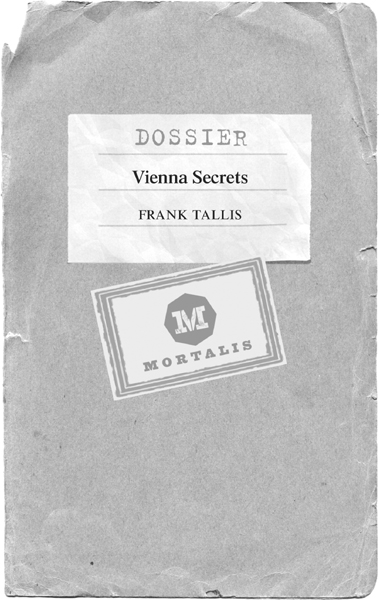
Also by Frank Tallis
Love Sick
A Death in Vienna
Vienna Blood
Fatal Lies
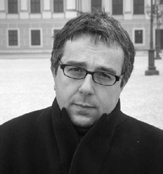
F RANK T ALLIS is a practicing clinical psychologist and an expert in obsessional states. He is the author of A Death in Vienna, Vienna Blood, and Fatal Lies, as well as seven nonfiction books on psychology and two previous novels, Killing Time and Sensing Others. He is the recipient of a Writers Award from the Arts Council England and the New London Writers Award from the London Arts Board. A Death in Vienna was short-listed for the 2005 Crime Writers Association Historical Dagger Award. Tallis lives in London.
S IGMUND F REUD WASNT A very good Jew. He opposed his wifes desire to establish a Jewish home, and his son Martin wrote that the Freud children were raised without any traces of or instruction in Jewish ritual. None of them, as far as Martin could remember, ever attended synagogue. Even worse, the Freud family celebrated Easter and Christmas! Freud dismissed religion as an illusion, published a critical work on Judaism at a time when thousands of Jews were being transported to concentration camps, and was concerned that psychoanalysis might become a parochial branch of medicine practiced only by Austrian Jews. He didnt want psychoanalysis to becomeas he put ita Jewish national affair. Indeed, this concern led him to name Carl Gustav Jung (known in psychoanalytic circles as the Teuton) as his successor.
Yet Freud had another, rather different side. He was an active member of a Jewish lodge, Bnai Brith, played cards with Jews every Saturday night, and loved Jewish jokes. He is remembered today, of course, as a great Jewish thinker.
Where then did Freud really stand on the subject of his own religion?
In biographies of Freud, the word ambivalence appears repeatedly in this context. But really, there was nothing truly ambivalent about Freuds position. He thought religion was nonsense but at the same time had many of what Dr. Dennis B. Klein of Kean University has described as Jewish attachments. These attachments were encouraged and strengthened by the anti-Semitism that had become so widespread in fin-de-sicle Vienna. Freud once remarked that Jews had no choice but to band together for as long as they were being persecuted. Thus, his Jewishness was largely expedient rather than natural.
Yet, commentators have often remarked that it is impossible to think of Freud without registeringat some levelthat he was a Jew, and psychoanalysis is frequently described as a Jewish phenomenon. The laws of motion would have been the same whatever creed Sir Isaac Newton had professed. If he had been a Hindu, then force would always equal mass times acceleration, and no one would ever have described the second law as an example of Hindu physics. The same, however, cannot be said of Freud. Even though he rejected Judaism, the fact that he was a Jew still seems relevant to his system of psychology. There is undeniably something about psychoanalysis that feels Jewish. This isnt a racist proposition. Many historians of psychoanalysis have made this point, and Freud himself would have agreed, which is why he wanted Jungthe Teutonto legitimize psychoanalysis for global consumption.
Font size:
Interval:
Bookmark:
Similar books «Vienna Secrets»
Look at similar books to Vienna Secrets. We have selected literature similar in name and meaning in the hope of providing readers with more options to find new, interesting, not yet read works.
Discussion, reviews of the book Vienna Secrets and just readers' own opinions. Leave your comments, write what you think about the work, its meaning or the main characters. Specify what exactly you liked and what you didn't like, and why you think so.

